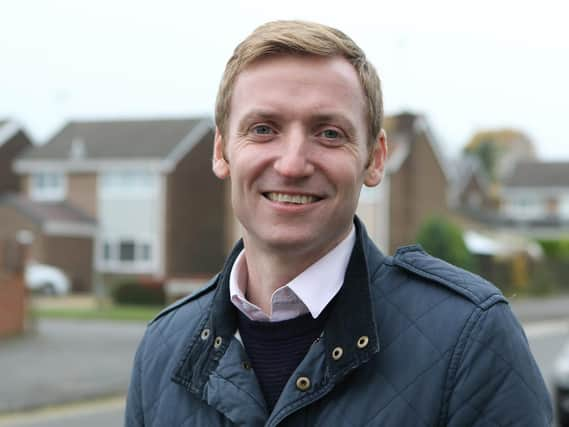Lee Rowley: 'I don't go to Westminster and take off my flat cap and put my whippet in a locker, I'll never be an MP of grievance'


But for Lee Rowley the bricks started crumbling two years before, when he was elected as the first Conservative MP in North East Derbyshire since 1935.
The son of a milkman, whose grandparents were miners, and who was the first in his family to go to university, 40-year-old Mr Rowley’s election story is one which is more likely to have formed the narrative of Boris Johnson’s 2019 landslide.
Advertisement
Hide AdAdvertisement
Hide AdBut he said: “I think there’s obviously been a long standing discussion in places like mine in North East Derbyshire, which is about how we ensure that we benefit in the way that other parts of the country have, putting aside the ideology and putting aside that inevitable discussion.”
Mr Rowley’s family had links to the National Union of Mineworkers but he said: “Back in the 80s, there was a clear change in what we had to do in the North and the Midlands, and that was very difficult, and I saw that growing up in Chesterfield. The important thing now is how we move forward with that.”
Mr Rowley said “not many people remembered blue rosettes” in his constituency when he began campaigning and knocking on doors.
“But I think it was just a longer term change of my part of the world and others - as we’ve seen two years after that - in terms of what they want to achieve, how they want to do it, and the people, they want to help do it,” he said.
Advertisement
Hide AdAdvertisement
Hide Ad“I think there was just a period over 20 years where we reassessed whether our representatives were the people who we thought were actually speaking with our voice, and that meant that there were changes firstly, in a few places in 2017, and then in a lot of places in 2019.”
Now Deputy Chairman of the Conservative Party, Mr Rowley says there has been a clear change in the way voters expect to be represented.
It is seen in how groups such as the Northern Research Group of Conservative MPs promote working for their constituency before they work for their Prime Minister, or how Hull West and Hessle Labour MP Emma Hardy this week stepped back from a shadow front bench role to focus on helping her constituents through coronavirus.
Compared to years gone by when a MP might visit their constituency once every few months, it represents a marked shift in priorities.
Advertisement
Hide AdAdvertisement
Hide Ad“I read once in a book when I had just got elected that there was an MP, I think in Halifax or Wakefield, and she didn’t live in the constituency and she used to do her annual progression to her constituency, where she would go to the railway station, would take a room in the hotel next door, and then invite people to come for like a day, before going back down to Westminster,” Mr Rowley recalled.
But he said: “There is no magic potion.
He added: “This is about making sure you go and represent your area. It’s about making sure that you stand up and you say what people think, you know, we’re not delegates, we have our own views, but ultimately, it’s about trying to make sure that the Midlands and the North are represented in terms of what the average man would say, on an average night in a pub.”
And he added: “Nobody’s perfect, nothing’s perfect, the Labour Party have their faults, the Conservative Party have their faults.
“But when I was growing up in Derbyshire, the things which the Conservative Party stood for - ambition, aspiration, a hand up, not a handout, making sure that we have strong communities and strong bonds within them, but also centering that very much on making sure that people have the right to make decisions about their lives - that’s the thing that appealed to me, it got me interested in politics.”
Advertisement
Hide AdAdvertisement
Hide AdHe said while he was interested in policy and economics, and the size of Government - big issues of state, the constituency still remained central.
“Ultimately, I still come home on a Thursday, I go back to North East Derbyshire, I spend three days talking to people, and it’s so important to do that, because they’re the guys who hired you, and they’re the guys who can fire you, and I want to know what they think so I can hopefully do better stuff down in Westminster the next week.”
Having already made his name on a number of issues, including his opposition to fracking which the Government has now effectively banned, Mr Rowley said there was a positivity about the future of the Midlands and the North.
“I’m never going to be an MP of grievance,” he said. “Because I think the North and the Midlands can do better than that. We’re not something to just point at, the North and the Midlands, we’re the embodiment of growth, ambition, aspiration, and we should be willing to say that.
Advertisement
Hide AdAdvertisement
Hide Ad“I don’t go down there [to Westminster] on the basis that ‘oh, the North had it terrible’, take my flat cap off and put my whippet in a locker and say ‘look how terrible is’ and the greyness disappears halfway down M1 or whatever. I go down there, because my area is a fantastic place to live and to work, it’s got so much opportunity, and I go down there to fight for it. And I think increasingly, the political discourse in the North is more pointed to that.”